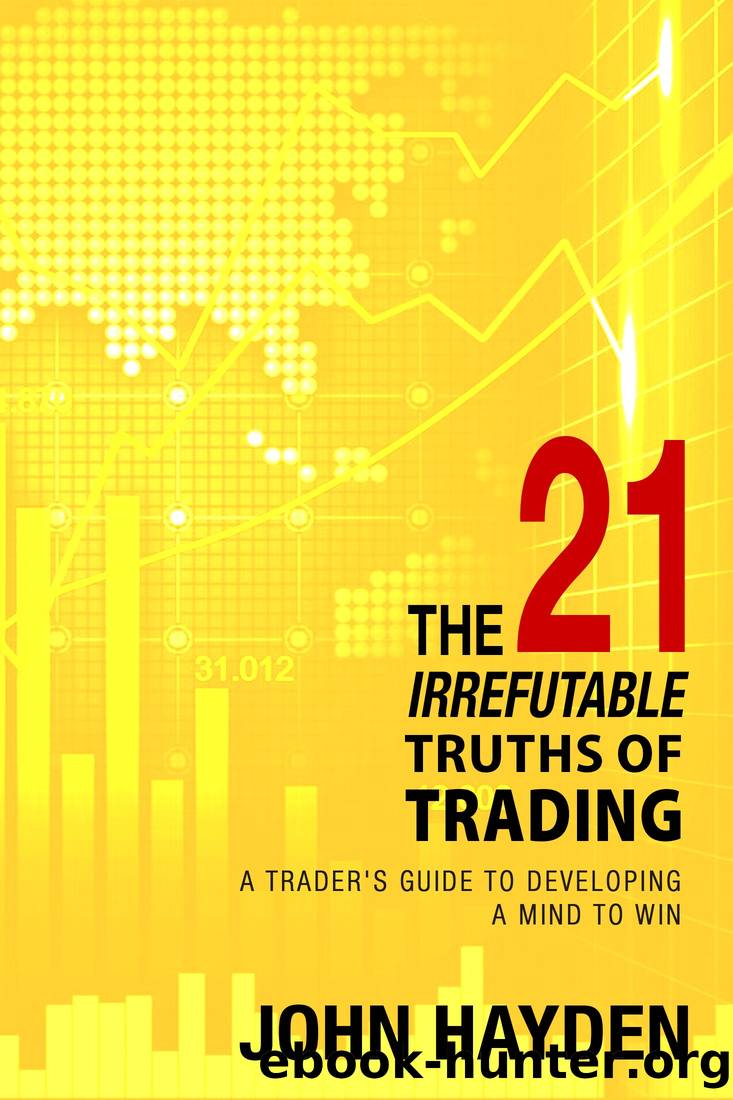The 21 Irrefutable Truths of Trading: A Trader's Guide to Developing a Mind to Win by John Hayden

Author:John Hayden [Hayden, John]
Language: eng
Format: epub
Tags: Trading, Financial, Stocks, Technical Analysis
ISBN: 0071378774
Amazon: B000FA5M3U
Publisher: McGraw-Hill Education, Riddler
Published: 2000-06-01T18:30:00+00:00
Chapter 15â Consistent Profits Come from Empowering Beliefs
Money is the most important thing in the world. It represents health, strength, honor, generosity, and beauty as conspicuously as the want of it represents illness, weakness, disgrace, meanness, and ugliness.
âGEORGE BERNARD SHAW
The use of money is all the advantage there is in having money.
âBENJAMIN FRANKLIN
Consistent profits come when a trader is able to consistently see the market as it is. Consistent profits result from taking consistent action. The underlying requirement is the ability to perceive the market correctly. As we know, perception is an interpretive act that is influenced by tradersâ beliefs, values, and expectations.
When traders are able to perceive the market correctly, they will be able to create a trading methodology that gives them an âedge,â or slight advantage over other traders.
It all starts with traders increasing their virtues. They must become more virtuous. I know that in this time and age virtue sounds a bit old-fashioned. But by becoming more virtuous, traders will be able to increase their empowering references and create better and more empowering beliefs.
Letâs review again some of the key beliefs that successful traders have about the market. They believe that the market is always correctâthat the price is where it should be. The market represents the psychology of all traders in any instant of time. The most valid moves are when the market shifts and there is no obvious explanation why. The market will always behave in an unexpected manner. The market is not like lifeâit is much more discontinuous than continuous. Never argue with the marketâunless you want to lose. The market will always go where it wants to. These are just a few beliefs of successful traders.
In short, the market can do anything, at any time, for any reason, the market is always right, and the market doesnât even know the individual traders exist. The most common beliefs that successful traders have about themselves is that they are responsible for their own actions, beliefs, perceptions, and risks, and they must devise their own trading methodology. In their view, trading methodology gives them part of their edge, and perception gives them the rest of their edge.
Just as traders have general beliefs about the market, they also have specific beliefs about what it takes to generate consistent profits. They also represent a winning trade differently from novice traders. Successful traders have specific beliefs that allow them to represent a loss so that it is empowering. Successful traders also represent a profit so that it empowers their belief structure. I can hear many of you saying, âWait a second, John. All my wins empower me!â If this is so, then why is it so difficult for a novice trader to exit from a winning trade?
The reason is fear. Novice traders have a deep fear of exiting a winning trade because it could go higher. If it did go higher, they would be âleaving money on the table.â When novice traders initially enter a trade, they are focusing on how much money they could lose and on how much money the
market could give them.
Download
This site does not store any files on its server. We only index and link to content provided by other sites. Please contact the content providers to delete copyright contents if any and email us, we'll remove relevant links or contents immediately.
Managing Business Ethics by unknow(494)
Incentives and Prosocial Behavior by Incentives & Prosocial Behavior(418)
Reframing Difference in Organizational Communication Studies: Research, Pedagogy, and Practice by Dennis K. Mumby (editor)(357)
Financial Markets, Public Policy, and the East Asian Miracle by Financial Markets Public Policy & the East Asian Miracle(313)
The 21 Irrefutable Truths of Trading: A Trader's Guide to Developing a Mind to Win by John Hayden(288)
Handbook of Intercultural Communication and Cooperation (9783666403279) by Unknown(277)
Fandom Analytics by Michael Lewis(273)
Human Security in Turkey by Alpaslan Özerdem Füsun Özerdem(270)
How the World Became Rich: The Historical Origins of Economic Growth by Mark Koyama & Jared Rubin(262)
Guns of the World by Unknown(255)
Inheritance and Wealth Inequality in Britain by Harbury Colin;Hitchins David;(241)
Asset Integrity Management Systems a Complete Guide - 2020 Edition (9780655989844) by Blokdyk Gerardus(238)
Creative problem solving for managers by Developing Skills for Decision Making & Innovation(235)
Food Security, Affordable Housing, and Poverty by Ahmet Suayb Gundogdu(234)
Beyond Positivism, Behaviorism, and Neoinstitutionalism in Economics by Deirdre Nansen McCloskey(233)
The Way of the Wall Street Warrior by Dave Liu & Adam Snyder(232)
Diminishing Returns by Mark Blyth(215)
The Delusions of Economics by Gilbert Rist;(209)
The Inclusion Toolbox by Jennifer A. Kurth & Megan Gross(209)
